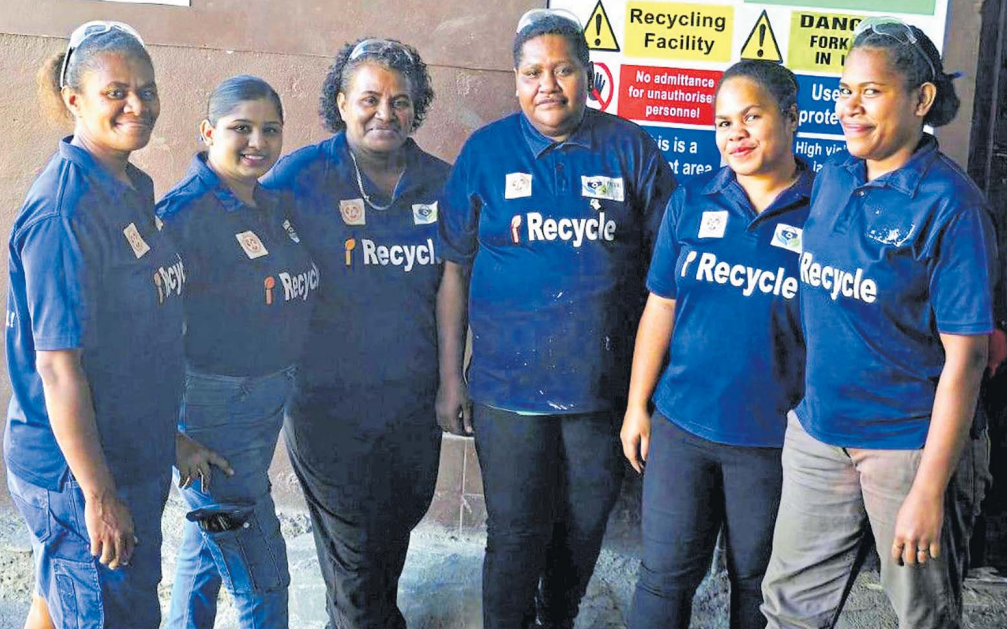Waste Recyclers Fiji Ltd (WRFL) is actively transforming the country’s traditionally male-dominated waste management sector by prioritising social inclusion and gender equity within its workplace.
The company is challenging longstanding stereotypes by not only welcoming women into its ranks but also empowering them to take on leadership roles.
Notably, women now comprise 36 per cent of the company’s workforce, a significant representation in an industry typically viewed as a “man’s world”.
WRFL has taken deliberate steps to ensure women — including those from marginalised and stigmatised backgrounds — are provided with opportunities to thrive.
Their approach involves supporting women’s professional development, promoting them to decision-making positions, and fostering an inclusive workplace culture.
By doing so, WRFL is demonstrating that gender equity in waste management is not just aspirational but achievable, serving as a model for other businesses in Fiji and the wider Pacific region.
This commitment not only empowers women but also brings broader social and economic benefits, helping to break cycles of exclusion and affirming the importance of diversity in the workplace.
WRFL chief executive officer and founder of the Pacific Recycling Foundation Amitesh Deo said 36 per cent of WRFL’s workforce did not emerge overnight.
He said it was the result of intentional, difficult, and often uphill efforts to challenge embedded norms, rebuild confidence, and reframe the narrative of who belongs in the waste management space.
“For decades, waste management space was seen as a masculine domain, not a place for women or anyone who did not fit the tough-guy image,” Mr Deo said.
“There was a societal perception that women simply could not or should not do this work, and, unfortunately, this belief seeped not only into institutions but into the minds of women themselves.”
He said the journey to inclusivity has been complex.
He explained convincing women to apply for roles at WRFL, even at entry or management levels, was not easy.
“The perception was strong and persistent that the yard was no place for women, that machines were meant for men, that management roles in a waste management company were a male right.
“There was a deeply rooted pre-determination.
“This self-perception, layered with societal bias, made it even harder to attract female applicants.”
Mr Deo recalled an early encounter that reflected the depth of resistance.
“Before the formation of PRF in 2022, a highly respected businessman once told us that women could never work in scrap yards, could never operate forklifts, and could never be part of this world.
“That kind of thinking, that women simply can not — is exactly what we are dismantling. Today, the results are visible and empowering.”
Some women at WRFL have transitioned from collecting recyclables at dump sites to full-time roles as forklift operators, yard staff, sorters, and machine handlers.
Others with formal qualifications and professional experience have taken on leadership roles across human resources, finance, project management, communications, audit, and grants.
Women are now represented at every level, from grassroots entry points to leadership positions.
According to Mr Deo, importantly, these women did not just transition into their roles; many of them have gone on to outperform their male counterparts in some roles.
He said they have not only proven they belong in these spaces, but they are also setting new standards of excellence and accountability.
Mr Deo said other marginalised groups, particularly members of the LGBTQI+ community, have faced even greater difficulty finding their place in this male-dominated space. The stigma, prejudice, and cultural silencing they face are deeply entrenched.
“In this sector, women and LGBTQI+ individuals have historically been told that they are too weak, too different, or simply not welcome.
“But at WRFL, they are now managing systems, mentoring others, and helping lead Fiji’s shift toward a more just and inclusive future.
“This is not just inclusion. It is healing. It is resistance. It is transformation.”
He said supporting and amplifying this cultural shift is the Pacific Recycling Foundation — the advocacy arm of WRFL, which is working to ensure that inclusion, especially of women and marginalised communities, becomes non-negotiable in how waste management and sustainability are structured in Fiji and across the Pacific.
“What we are doing here sends a message far beyond our yards.
“We are breaking the silence around gender and exclusion in this industry.
“We are making it clear that this space, once believed to belong only to men, now rightfully belongs to women, to LGBTQI+ persons, and to everyone who was once excluded.”
Mr Deo emphasised that this change did not emerge in isolation.
“It stands on the shoulders of movements and organisations that paved the way, particularly the Fiji Women’s Crisis Centre, whose years of advocacy for women’s rights, safety, and dignity laid the foundation for inclusive progress in traditionally male spaces.”
WRFL is now urging other organisations across all sectors to reflect deeply on who is included in their visions of progress.
Mr Deo said this journey is not just about recycling, it’s about dignity, about undoing decades of exclusion, about rewriting narratives, and above all, ensuring no one is left behind.



